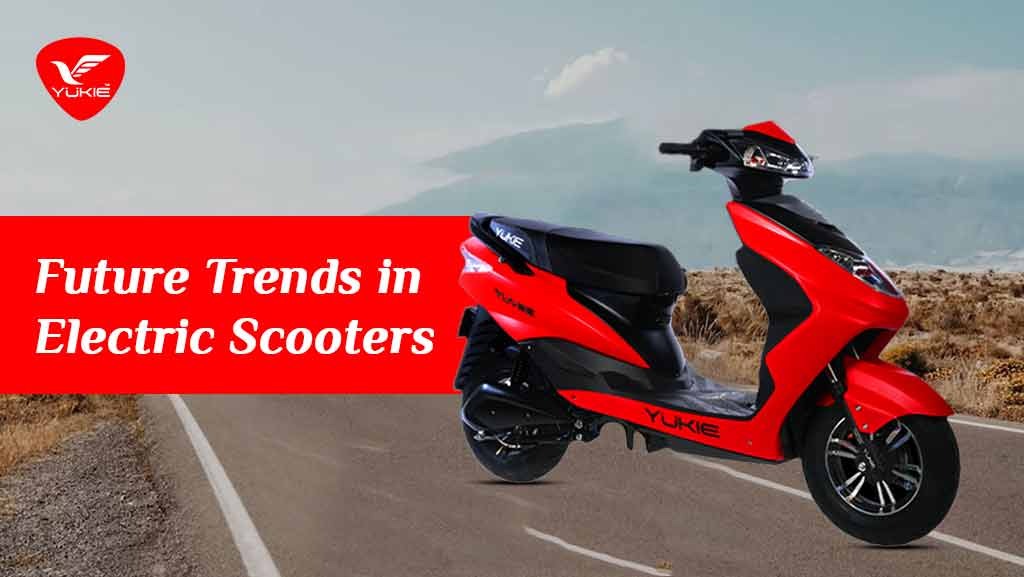In recent years, electric scooters have emerged as a popular and sustainable mode of urban
transportation. With advancements in battery technology, motor efficiency, and design
innovation, electric scooters are poised to revolutionise the way we commute and explore
our cities. In this blog, we’ll delve into the exciting future trends shaping the electric scooter
industry and envision how these innovations will enhance our mobility experience.
1. Increased Range and Battery Efficiency
One of the most significant trends driving the evolution of electric scooters is the
improvement in battery technology, leading to increased range and efficiency. As battery
technology continues to advance, electric scooters are becoming capable of traveling longer
distances on a single charge. Manufacturers are investing in high-capacity lithium-ion
batteries and implementing energy-efficient motor systems to extend the range of electric
scooters, making them a viable option for longer commutes and urban exploration.
2. Lightweight and Foldable Designs
Portability and convenience are key considerations for urban commuters, and future electric
scooters are expected to feature lightweight and foldable designs for easy storage and
transport. Manufacturers are incorporating lightweight materials such as carbon fiber and
aluminum alloys to reduce the weight of electric scooters without compromising on durability.
Additionally, foldable designs allow electric scooters to be conveniently carried on public
transportation or stored in small spaces, making them ideal for urban dwellers with limited
storage space.
3. Smart Connectivity and IoT Integration
The integration of smart connectivity and Internet of Things (IoT) technology is another
exciting trend shaping the future of electric scooters. Manufacturers are equipping electric
scooters with built-in GPS navigation, smartphone connectivity, and app-based features to
enhance the user experience. Riders can track their route, monitor battery status, and
receive real-time updates on traffic conditions and weather forecasts through dedicated
mobile apps. Additionally, IoT integration enables remote diagnostics and over-the-air
software updates, ensuring that electric scooters remain up-to-date and optimized for
performance.
4. Enhanced Safety Features
Safety is paramount in urban transportation, and future electric scooters are expected to
incorporate advanced safety features to protect riders and pedestrians. Manufacturers are
integrating technologies such as anti-lock braking systems (ABS), traction control, and
collision detection sensors to enhance stability and prevent accidents. Additionally, LED
lighting systems and reflective materials improve visibility in low-light conditions, increasing
awareness and reducing the risk of collisions. With safety being a top priority, electric
scooters are evolving to provide a secure and reliable mode of transportation for riders of all
skill levels.
5. Sustainable Materials and Eco-Friendly Manufacturing
As environmental consciousness grows, manufacturers are focusing on sustainability and
eco-friendly manufacturing practices in the production of electric scooters. Future electric
scooters are expected to feature recycled and renewable materials, as well as
environmentally friendly manufacturing processes to minimize their carbon footprint.
Additionally, manufacturers are exploring alternative energy sources such as solar and
kinetic energy harvesting to power electric scooters, further reducing their environmental
impact and promoting sustainable mobility solutions.
6. Urban Infrastructure Integration
The integration of electric scooters into existing urban infrastructure is another trend that will
shape the future of urban mobility. Cities are investing in dedicated bike lanes, charging
stations, and parking facilities to accommodate the growing popularity of electric scooters
and other micro-mobility devices. Additionally, urban planners are incorporating electric
scooter-sharing programs into public transportation networks to provide commuters with
convenient and flexible last-mile connectivity options. By integrating electric scooters into
urban infrastructure, cities can promote sustainable transportation alternatives and reduce
congestion and pollution.
7. Personalization and Customization Options
Personalization and customization options are becoming increasingly important for electric
scooter enthusiasts looking to express their individuality and style. Manufacturers are
offering a wide range of color choices, accessories, and customization options to cater to
diverse preferences and tastes. From customizable LED lighting to interchangeable panels
and decals, riders can personalize their electric scooters to reflect their personality and
lifestyle, creating a unique and distinctive riding experience.
8. Autonomous and Self-Driving Features
Looking further into the future, autonomous and self-driving electric scooters represent a
futuristic trend that holds the potential to transform urban transportation. Manufacturers and
technology companies are exploring autonomous navigation systems, artificial intelligence
algorithms, and sensor technologies to enable self-driving electric scooters that can navigate
city streets safely and efficiently. While still in the early stages of development, autonomous
electric scooters have the potential to revolutionize urban mobility by providing on-demand
transportation services that are convenient, cost-effective, and environmentally friendly.
In conclusion, the future of electric scooters is bright and promising, with exciting trends
shaping the evolution of urban mobility. From increased range and battery efficiency to
lightweight and foldable designs, smart connectivity, enhanced safety features, and
sustainable manufacturing practices, electric scooters are poised to revolutionize the way we
commute and explore our cities. As technology continues to advance and urbanization
accelerates, electric scooters will play an increasingly important role in providing convenient,
efficient, and eco-friendly transportation solutions for urban dwellers around the world.
